Editor's note: The goal of The EBM Toolbox is to promote awareness of tools and methods for facilitating EBM and MSP processes. It is brought to you by the EBM Tools Network (www.ebmtools.org), a voluntary alliance of tool users, developers, and training providers.
In 2016, the EBM Tools Network compiled a list of hands-on activities for teaching about ecosystem services and ecosystem-based management (now updated with several more activities!). A university professor recently asked if we have any similar resources for teaching marine protected area (MPA) design and management. EBM Tools Network members pooled their collective knowledge again and came up with this fantastic list of resources for teaching about MPAs at all educational levels.
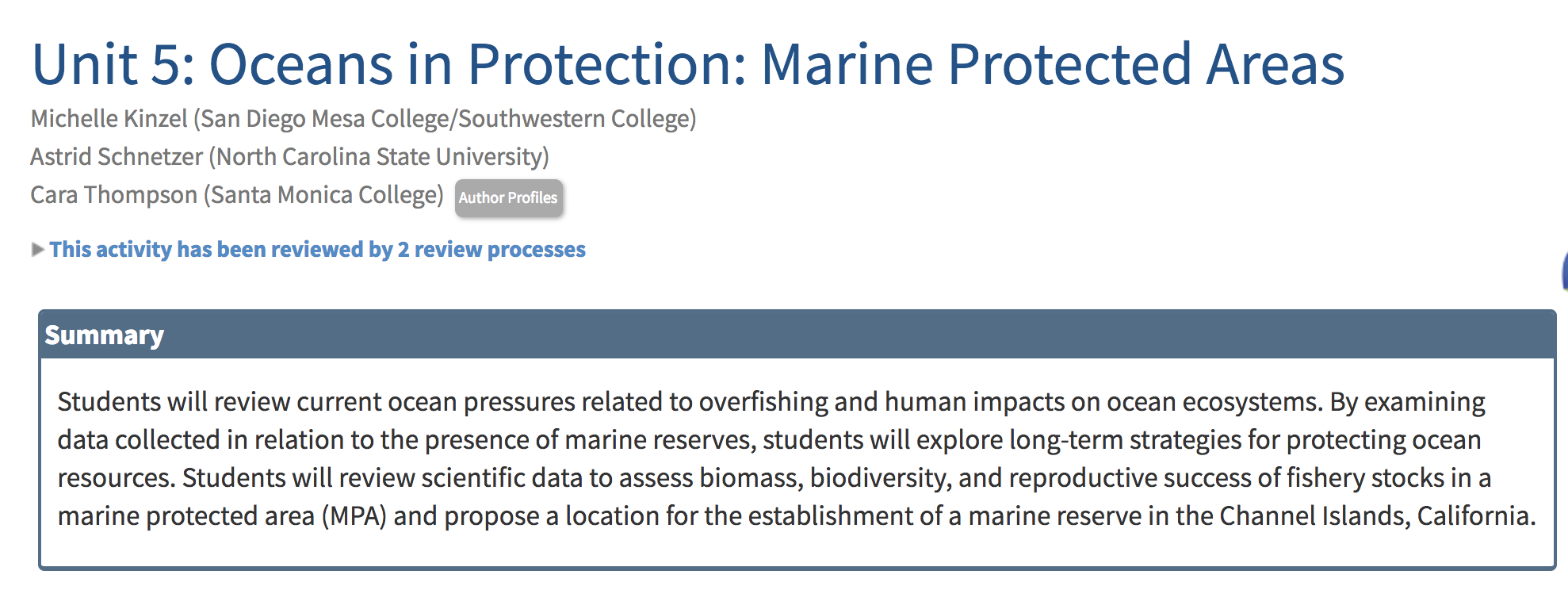 50-minute teaching unit on MPAs for undergraduates. This unit is part of a two- to three-week module on ocean sustainability created for the InTeGrate project. In this unit, students review current pressures on ocean ecosystems, learn to define MPAs and marine reserves, and examine scientific evidence related to the presence of marine reserves. They also conduct a hands-on exercise to map ideal locations for the creation of a marine reserve, considering oceanographic, biological, and sociological factors in their decision-making process. Access the teaching unit.
50-minute teaching unit on MPAs for undergraduates. This unit is part of a two- to three-week module on ocean sustainability created for the InTeGrate project. In this unit, students review current pressures on ocean ecosystems, learn to define MPAs and marine reserves, and examine scientific evidence related to the presence of marine reserves. They also conduct a hands-on exercise to map ideal locations for the creation of a marine reserve, considering oceanographic, biological, and sociological factors in their decision-making process. Access the teaching unit.
- Interactive simulation on marine reserves and local fisheries for advanced
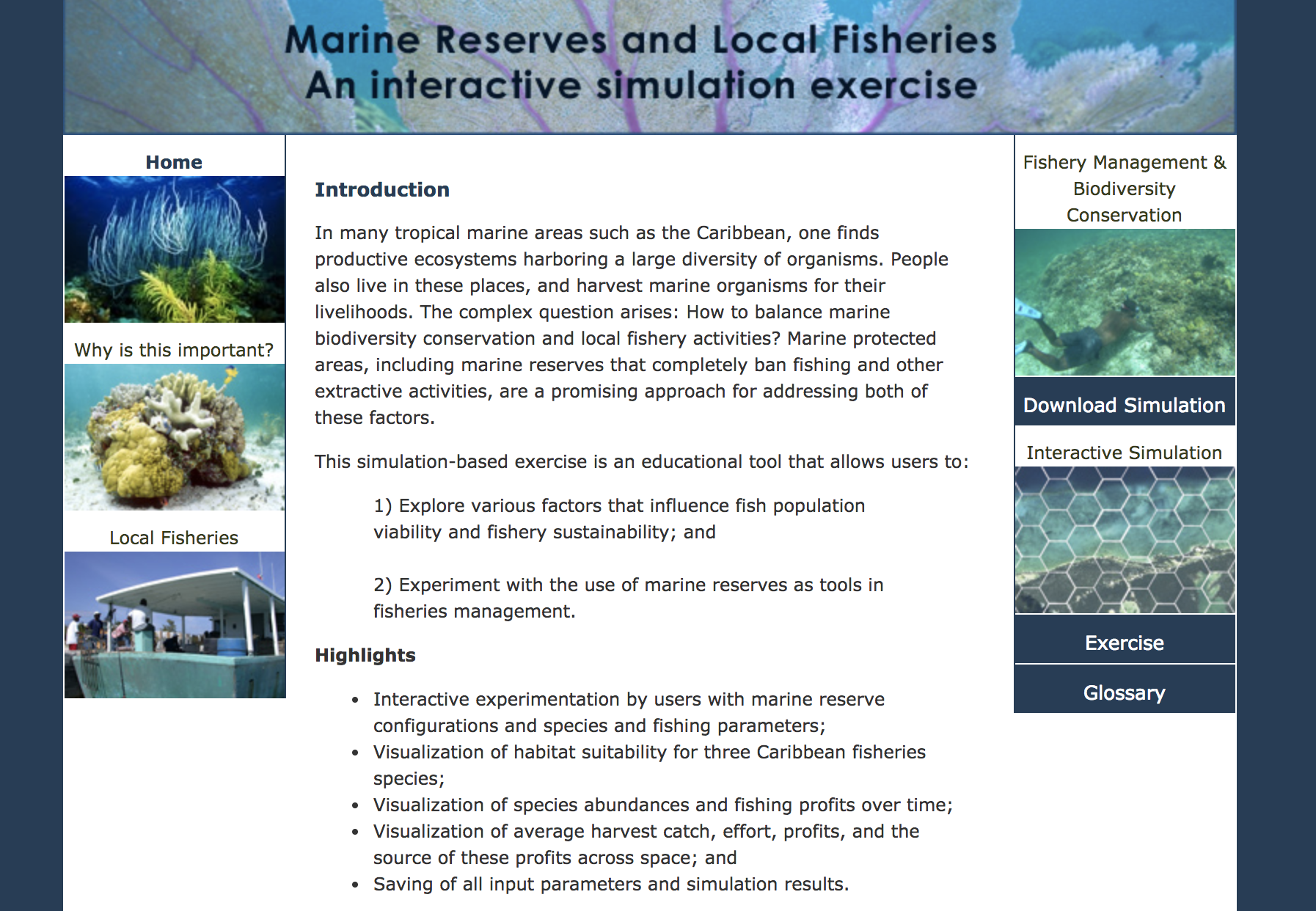 undergraduates and graduate students. Created by the American Museum of Natural History, this tool allows users to look at how species attributes (such as reproductive rate and mobility), fisheries economics, and reserve design (size and placement relative to habitat quality and fishing ports) influence short-term fisheries dynamics and longer-term sustainability. The simulation comes with an associated exercise and exercise solutions. The downloadable exercise generally takes longer than a single class period but can be scaled to shorter time frames by having groups of students focus on different aspects of the exercise and share results. Access the simulation. (Note: Registration approval could take 1-2 days.) Read a published description of a classroom activity using the simulation.
undergraduates and graduate students. Created by the American Museum of Natural History, this tool allows users to look at how species attributes (such as reproductive rate and mobility), fisheries economics, and reserve design (size and placement relative to habitat quality and fishing ports) influence short-term fisheries dynamics and longer-term sustainability. The simulation comes with an associated exercise and exercise solutions. The downloadable exercise generally takes longer than a single class period but can be scaled to shorter time frames by having groups of students focus on different aspects of the exercise and share results. Access the simulation. (Note: Registration approval could take 1-2 days.) Read a published description of a classroom activity using the simulation.
- Teaching module on MPAs for advanced undergraduates and graduate students (available in English and French). This module, hosted on the Network of Conservation Educators and Practitioners website, introduces MPAs, including costs and benefits, relationships to biodiversity and fisheries management, design and implementation, and governance and management issues. An accompanying role-playing exercise allows students to experience the challenges of developing an MPA plan that satisfies diverse users while meeting common objectives. A teaching presentation and evaluation tool and solutions are also available for educators. Access the module. (Note: Registration approval could take 1-2 days.)
- Multi-player serious game on marine spatial planning, including the planning
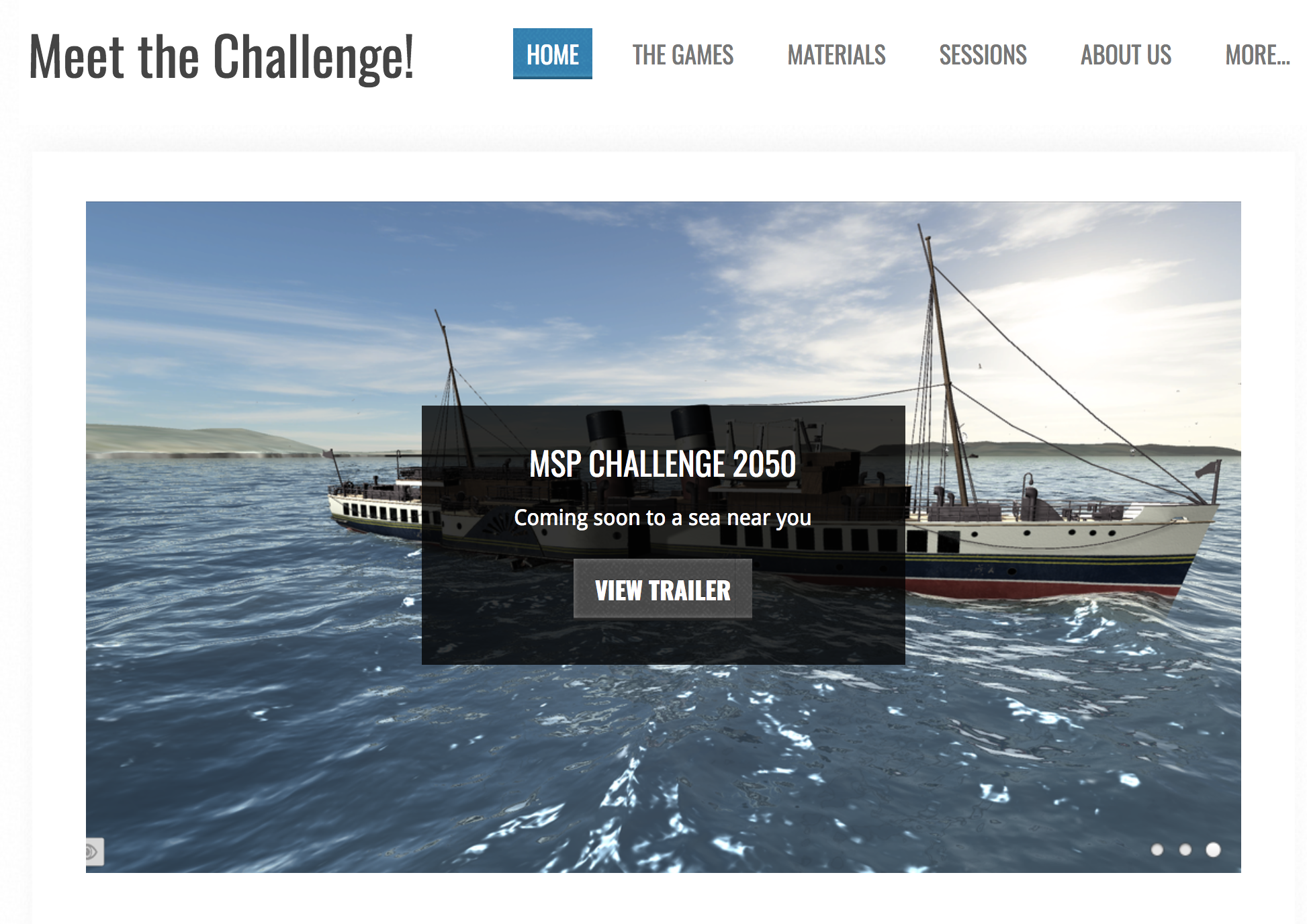 and implementation of MPAs, for stakeholders. Designed to educate stakeholders about complexities and conflicts in MSP processes, this tool, originally developed by a collaboration in the Netherlands, includes the planning and implementation of MPAs in an MSP context. The recent introduction of Ecopath with Ecosim (EwE) in the MSP Platform game also allows it to account for the short- and long-term ecological impacts of MPAs. Games have been implemented for the North Sea and Firth of Clyde, and a game for the Baltic is under development. Games for the Israeli EEZ and other areas are planned, as is a game of a hypothetical area intended for teaching and free game play. Learn more about the game. Read about game usage here and here. A manuscript describing the latest developments, including the EwE integration, is in progress.
and implementation of MPAs, for stakeholders. Designed to educate stakeholders about complexities and conflicts in MSP processes, this tool, originally developed by a collaboration in the Netherlands, includes the planning and implementation of MPAs in an MSP context. The recent introduction of Ecopath with Ecosim (EwE) in the MSP Platform game also allows it to account for the short- and long-term ecological impacts of MPAs. Games have been implemented for the North Sea and Firth of Clyde, and a game for the Baltic is under development. Games for the Israeli EEZ and other areas are planned, as is a game of a hypothetical area intended for teaching and free game play. Learn more about the game. Read about game usage here and here. A manuscript describing the latest developments, including the EwE integration, is in progress.
- 30-minute video on the Cabo Pulmo MPA and other MPAs for general public. In this video from The Economist, viewers join the crew of a ship on a mission to save the vaquita, one of the most endangered animals on earth. Issues pertaining to the Cabo Pulmo National Marine Park and MPAs in general (e.g., local livelihoods, overfishing, poaching, tourism) are discussed. See the video.
- Science of marine reserves summaries for undergraduates, graduate
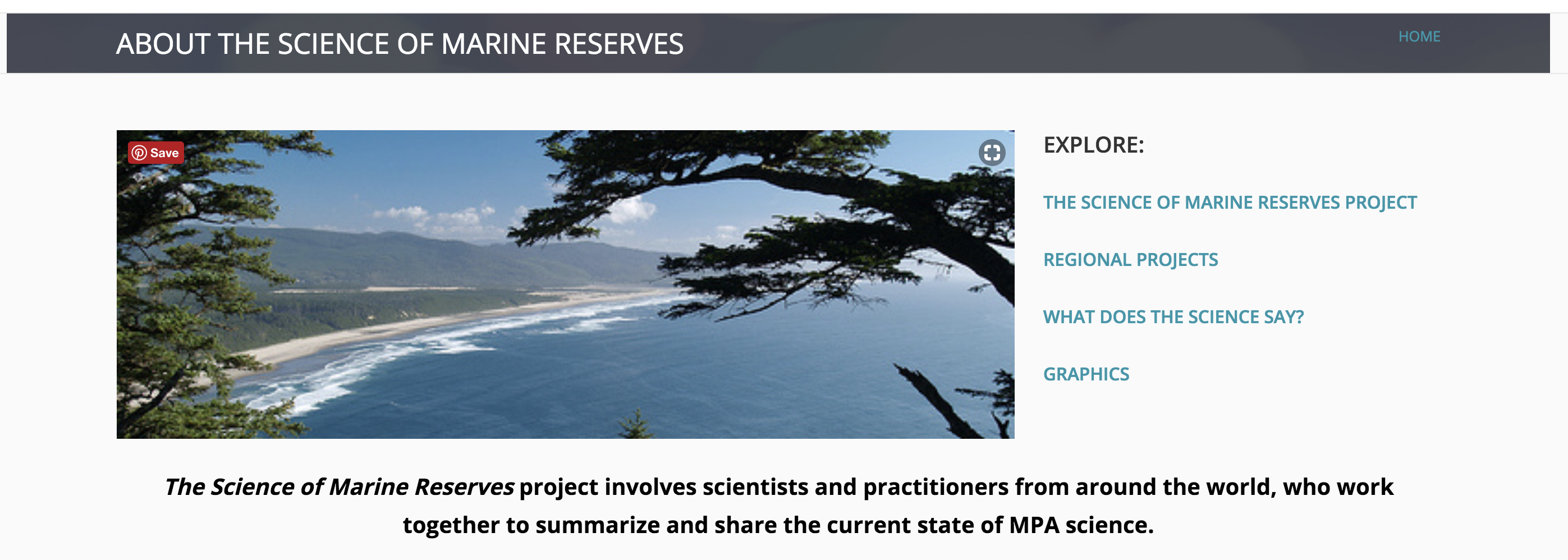 students, and conservation/management professionals. The Science of Marine Reserves summaries, developed by global experts under the leadership of the Partnership for Interdisciplinary Studies of Coastal Oceans (PISCO), present scientific information from over 300 recent publications about marine reserves and other MPAs. The data are presented in an engaging and easy-to-understand format, highlighting case studies from diverse places.
students, and conservation/management professionals. The Science of Marine Reserves summaries, developed by global experts under the leadership of the Partnership for Interdisciplinary Studies of Coastal Oceans (PISCO), present scientific information from over 300 recent publications about marine reserves and other MPAs. The data are presented in an engaging and easy-to-understand format, highlighting case studies from diverse places.
- Versions of the summaries are available for the Mediterranean, the European Union, Latin American and the Caribbean, the US, and other non-US locations.
- Graphics from the summaries are also available for download and use in teaching materials.
- Curricular materials for 6-week course for MPA professionals. This material was developed by WWF South Africa to train MPA staff. Originally developed for presentation in one-week-per-month intervals over the course of six months, the material has also been modified for use in a 5-day introductory course. For more information, contact Robin Adams at radams@wwf.org.za.
- Curricular material for 10-day course for MPA professionals (available in English, Spanish and French). This material was developed by the UNEP Caribbean Environment Programme to train MPA managers and other senior personnel associated with MPAs in the region. It is typically presented in one ~10-day session. It consists of eight modules on Caribbean MPA planning, stakeholder participation, management, research, monitoring and regional policy, along with communication and teaching skills.
- MPA management toolkit for MPA professionals. Developed by the
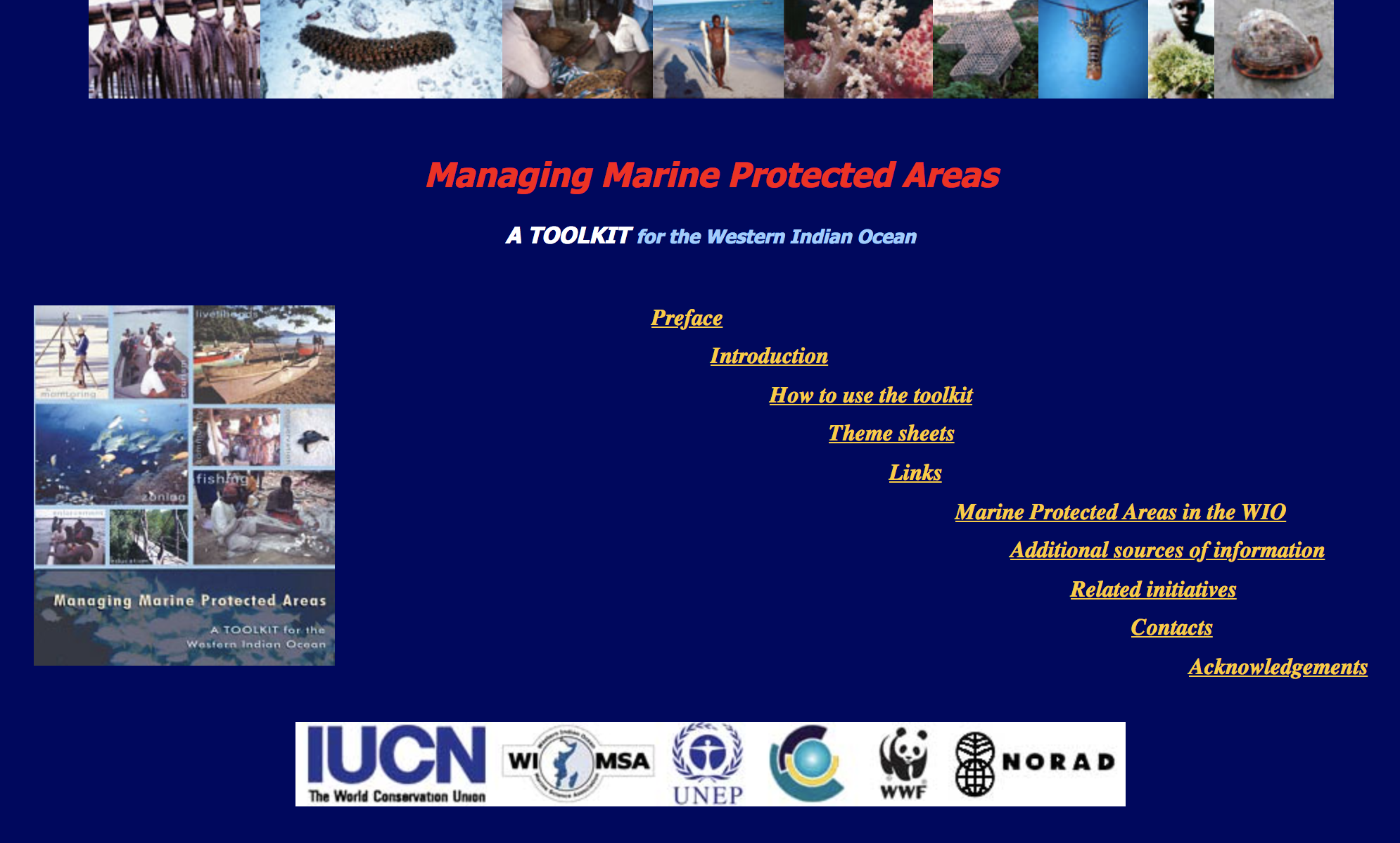 IUCN/NORAD WIO Marine Biodiversity Conservation Project, this toolkit consists of a ring-binder of theme sheets, each of which addresses a key issue faced by an MPA manager, with a focus on the situation in the Western Indian Ocean. The toolkit is designed to address management issues relevant to all types of MPAs, from community-based, locally-managed areas to nationally-gazetted marine parks.
IUCN/NORAD WIO Marine Biodiversity Conservation Project, this toolkit consists of a ring-binder of theme sheets, each of which addresses a key issue faced by an MPA manager, with a focus on the situation in the Western Indian Ocean. The toolkit is designed to address management issues relevant to all types of MPAs, from community-based, locally-managed areas to nationally-gazetted marine parks.
- US NOAA National MPA Center and National Marine Sanctuaries websites for general public, stakeholders, undergraduates, graduate students, and conservation/management professionals. The website is a wealth of easily-readable information about understanding, managing, and communicating about MPAs. Some critical pages include:
If you are looking for live training for MPA professionals, some programs that we know of (many scheduled on demand) include:
- CaMPAM’s Training of Trainers course
- US NOAA’s International Marine Protected Areas Capacity Building Team (IMPACT) trainings
- Reef Ecologic’s International Coral Reef Management and Leadership course
- WIOMSA and URI’s Western Indian Ocean Certification of Marine Protected Area Professionals (WIO-COMPAS) program
- MPA Enforcement International trainings
If you are interested in adding a resource to this list or getting the contact information for someone involved with a resource, please contact the EBM Tools Network coordinator at ebmtools@natureserve.org.
